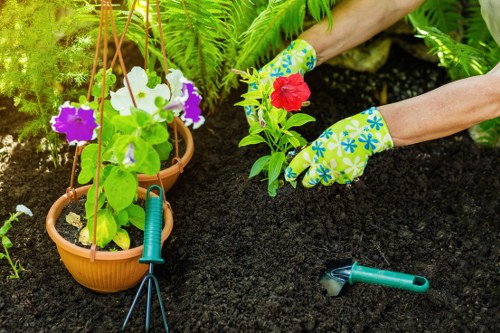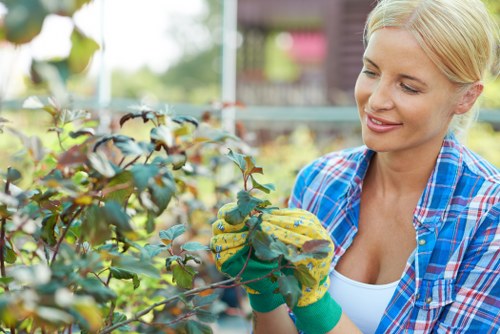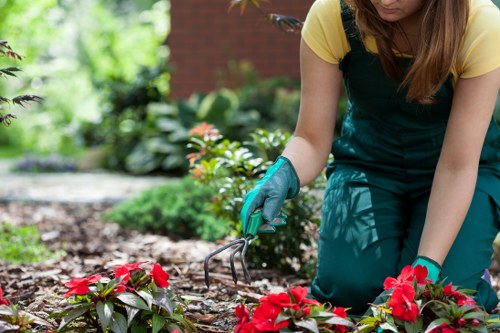Comprehensive Guide to Garden Maintenance in Brent Cross

Introduction to Garden Maintenance
Maintaining a beautiful garden in Brent Cross requires dedication, knowledge, and the right strategies. Whether you're a seasoned gardener or a novice, understanding the fundamentals of garden maintenance can transform your outdoor space into a vibrant and thriving environment.
Brent Cross, with its unique climate and soil conditions, presents both opportunities and challenges for garden enthusiasts. Proper maintenance ensures that your plants not only survive but flourish throughout the year.
In this article, we will explore essential tips and techniques for effective garden maintenance in Brent Cross, helping you achieve a picturesque garden that stands out in your neighborhood.

Understanding Brent Cross Climate
The climate in Brent Cross is characterized by mild winters and warm summers, with moderate rainfall distributed throughout the year. This climate is conducive to a wide variety of plants, but it's important to select species that can thrive under these conditions.
Knowledge of local weather patterns is crucial for planning your garden activities. For instance, scheduling planting and pruning during optimal seasons can significantly impact plant health and growth.
Additionally, understanding the microclimates within your garden, such as areas that receive more sunlight or shade, can help in positioning plants appropriately for their specific needs.

Soil Preparation and Management
Testing and Amending Soil
Healthy soil is the foundation of a thriving garden. Conducting a soil test helps determine pH levels and nutrient content, allowing you to make informed decisions about amendments.
Organic matter, such as compost, enriches the soil, improving its structure, fertility, and drainage. Regularly adding compost can enhance plant growth and resilience.
Addressing soil compaction through techniques like aeration ensures that roots have access to essential oxygen and water, promoting robust plant development.
- Conduct a soil test annually.
- Add organic compost to improve soil structure.
- Aerate compacted areas to facilitate root growth.

Plant Selection and Care
Choosing the Right Plants
Selecting plants that are well-suited to Brent Cross's climate and soil conditions is vital. Opt for native species or those that have adapted to local environmental factors for better resilience and lower maintenance.
Consider factors such as sunlight exposure, water requirements, and growth habits when planning your garden layout. Grouping plants with similar needs can simplify care routines and optimize resource usage.
Incorporating a mix of perennial and annual plants ensures continuous bloom and interest throughout different seasons, enhancing the garden's aesthetic appeal.
- Choose native or climate-adapted plants.
- Group plants with similar care requirements.
- Mix perennials and annuals for year-round color.

Regular Maintenance Practices
Watering and Irrigation
Consistent and appropriate watering is essential for garden health. Implementing an efficient irrigation system, such as drip irrigation, can conserve water and ensure targeted delivery to plant roots.
Adjust watering schedules based on seasonal changes and specific plant needs. Overwatering can lead to root rot, while underwatering stresses plants and inhibits growth.
Mulching around plants helps retain soil moisture, suppress weeds, and regulate soil temperature, contributing to overall plant vitality.
- Install a drip irrigation system for efficient water use.
- Monitor soil moisture levels regularly.
- Apply mulch to conserve moisture and control weeds.
Pruning and Trimming
Regular pruning promotes healthy growth, removes dead or diseased branches, and maintains the desired shape and size of plants. It's particularly important for shrubs and trees to ensure proper air circulation and sunlight penetration.
Use sharp and clean tools to make precise cuts, reducing the risk of plant damage or disease transmission. Timing your pruning activities according to plant species and growth cycles enhances effectiveness.
Incorporate pruning into your seasonal maintenance schedule to address growth patterns and prepare plants for upcoming weather conditions.
- Prune during the dormant season for most trees and shrubs.
- Remove dead or diseased branches promptly.
- Shape plants to improve aesthetics and health.
Weed Control
Weeds compete with your garden plants for nutrients, water, and light, hindering their growth. Implementing effective weed control measures is crucial for maintaining a healthy garden.
Manual weeding, combined with mulch application, can significantly reduce weed proliferation. In cases of persistent weeds, consider organic or chemical weed control methods, ensuring minimal impact on desirable plants.
Regular maintenance and monitoring help prevent weeds from establishing and spreading, simplifying long-term garden management.
- Remove weeds regularly to prevent competition.
- Use mulch to suppress weed growth.
- Apply organic herbicides as needed.
Fertilization
Providing appropriate nutrients through fertilization supports plant growth and productivity. Choose fertilizers based on soil test results and specific plant requirements to avoid over-fertilization or nutrient deficiencies.
Organic fertilizers, such as compost or manure, offer slow-release nutrients that enhance soil health. In contrast, synthetic fertilizers provide targeted nutrient boosts for immediate plant needs.
Establish a fertilization schedule that aligns with plant growth stages, ensuring optimal nutrient availability during critical periods.
- Select fertilizers based on soil test recommendations.
- Use organic options for long-term soil health.
- Follow a consistent fertilization schedule.

Pest and Disease Management
Identifying Common Pests
Brent Cross gardens may encounter a variety of pests, including aphids, slugs, and caterpillars. Recognizing the signs of pest infestations early allows for timely intervention.
Regularly inspect plants for damage, discoloration, or the presence of insects. Early detection facilitates the use of targeted control measures, minimizing the impact on your garden.
Implement integrated pest management (IPM) strategies, combining biological, cultural, and mechanical controls to manage pest populations effectively and sustainably.
- Inspect plants weekly for signs of pests.
- Use natural predators like ladybugs to control aphids.
- Apply barriers or traps to manage slug populations.
Tackling Plant Diseases
Fungal, bacterial, and viral diseases can affect garden plants, leading to reduced growth and aesthetic appeal. Proper identification and management are essential to prevent the spread of diseases.
Maintain good garden hygiene by removing infected plant debris and ensuring adequate air circulation around plants. Avoid overhead watering to reduce the risk of fungal infections.
Choose disease-resistant plant varieties when available, and consider applying appropriate fungicides or bactericides as needed to manage outbreaks.
- Remove and dispose of diseased plant material.
- Ensure proper spacing for air circulation.
- Use disease-resistant plant varieties.
Organic Pest Control Methods
Adopting organic pest control methods promotes a healthy garden ecosystem and minimizes the use of harmful chemicals. Methods include using neem oil, insecticidal soaps, and introducing beneficial insects.
Companion planting, where certain plants are grown together to deter pests, can also be an effective organic strategy. For example, planting marigolds near vegetables can repel aphids and other common pests.
Regular maintenance practices, such as removing weeds and debris, reduce pest habitats and contribute to overall garden health.
- Apply neem oil to deter a wide range of pests.
- Use insecticidal soaps for soft-bodied insects.
- Introduce beneficial insects like predatory beetles.

Seasonal Garden Maintenance
Spring Maintenance
Spring is a critical time for garden maintenance in Brent Cross. Start by cleaning up any winter debris, pruning dead branches, and preparing soil for planting.
Planting new flowers, vegetables, and shrubs during spring takes advantage of the growing season's favorable conditions, setting the stage for a productive year.
Ensure that irrigation systems are functional and make any necessary adjustments to handle increased watering needs as plants begin to grow.
- Remove winter debris and prune plants.
- Prepare soil by adding compost or fertilizers.
- Plant new species suited to spring growth.
Summer Maintenance
During summer, focus on regular watering, weeding, and monitoring for pests and diseases. The warmer temperatures encourage plant growth but also increase the risk of pest infestations.
Mulching helps retain soil moisture and keep plant roots cool, while shading plants during the hottest parts of the day can prevent stress and sunburn.
Prune as needed to maintain plant shape and remove any damaged or diseased parts promptly.
- Maintain consistent watering schedules.
- Apply mulch to conserve moisture.
- Monitor and control pests proactively.
Autumn Maintenance
Autumn is the time to prepare your garden for the colder months. Begin by harvesting remaining produce, cleaning up fallen leaves, and pruning plants to promote healthy growth in the spring.
Planting bulbs for spring flowers can add color and variety to your garden next year. Additionally, protect sensitive plants by applying mulch or using protective covers to insulate roots.
Review your garden's performance over the past year and plan for improvements or changes to enhance its beauty and functionality.
- Harvest and clean up garden beds.
- Plant spring-blooming bulbs.
- Protect plants from winter conditions.
Winter Maintenance
Winter in Brent Cross may be mild, but it's still important to protect your garden from potential frost and freeze damage. Use frost blankets or covers for sensitive plants during cold snaps.
Continue to monitor plants for any signs of stress or disease, addressing issues promptly to ensure a healthy start in the spring.
Plan and prepare by ordering seeds, tools, and materials needed for the upcoming gardening season, ensuring you're ready to hit the ground running.
- Protect sensitive plants with frost covers.
- Maintain tools and equipment.
- Plan next season's garden layout and plant selection.

Landscape Design and Enhancement
Creating a Balanced Layout
A well-designed garden layout enhances both aesthetics and functionality. Balance different elements such as plant types, colors, and textures to create a harmonious outdoor space.
Incorporate focal points like feature plants, garden sculptures, or water elements to draw attention and add visual interest. Pathways and seating areas provide structure and encourage exploration.
Consider the scale and proportion of plants relative to each other and the overall garden size to maintain balance and prevent overcrowding.
- Use a mix of plant heights and textures.
- Create focal points for visual interest.
- Ensure pathways and seating areas are strategically placed.
Incorporating Hardscaping Elements
Hardscaping elements like patios, decks, and garden borders add structure and functionality to your garden. These features provide areas for relaxation, dining, and entertaining, enhancing the overall outdoor living experience.
Choose materials that complement your garden's style and are durable enough to withstand Brent Cross's climate. Properly integrated hardscaping can also aid in defining different garden zones and managing soil erosion.
Maintenance of hardscaping features involves regular cleaning, sealing, and repairs to ensure longevity and sustained beauty.
- Install durable patios and decks for outdoor activities.
- Use garden borders to define spaces and control plant spread.
- Maintain hardscaping elements to preserve their appearance and functionality.
Enhancing with Lighting
Garden lighting extends the usability of your outdoor space into the evening hours and highlights key features. Incorporate a mix of ambient, task, and accent lighting to create a well-lit and inviting atmosphere.
Solar-powered lights are an eco-friendly option that reduces energy consumption, while LED fixtures offer long-lasting and energy-efficient performance.
Strategically place lights to enhance pathways, seating areas, and focal points, ensuring safety and adding a magical touch to your garden after dark.
- Use solar or LED lights for energy-efficient garden illumination.
- Highlight pathways and key garden features with strategic lighting.
- Create ambiance with soft, ambient lighting for evening relaxation.

Tools and Equipment for Garden Maintenance
Essential Gardening Tools
Having the right tools is crucial for efficient garden maintenance. Basic tools include spades, rakes, pruners, and watering equipment, each serving a specific purpose in maintaining your garden.
Investing in high-quality, ergonomic tools can reduce physical strain and improve the effectiveness of your gardening tasks. Regular maintenance of tools ensures their longevity and performance.
Store tools properly to protect them from weather elements and prevent rusting or damage, ensuring they are ready for use when needed.
- Spades and shovels for digging and soil preparation.
- Pruners and shears for trimming and shaping plants.
- Rakes and hoes for weeding and soil leveling.
Advanced Garden Equipment
For larger gardens or more intensive maintenance tasks, advanced equipment like lawnmowers, tillers, and irrigation systems become essential. These tools enhance efficiency and reduce the time required for upkeep.
Battery-powered or electric tools offer environmentally friendly alternatives to traditional gas-powered equipment, while also being quieter and easier to maintain.
Select equipment based on the specific needs of your garden, considering factors like garden size, terrain, and personal physical capabilities.
- Lawnmowers for maintaining grass health and appearance.
- Tillers and cultivators for soil aeration and preparation.
- Automated irrigation systems for consistent and efficient watering.
Safety and Maintenance of Tools
Ensuring the safety and proper maintenance of gardening tools is essential to prevent accidents and extend their lifespan. Always wear appropriate protective gear, such as gloves and safety glasses, when using tools.
Regularly clean tools after use to remove dirt and debris, and inspect them for any signs of damage or wear. Sharpen blades and replace worn parts to maintain their effectiveness.
Store tools in a dry, secure location to protect them from the elements and unauthorized use, keeping your garden maintenance routine safe and efficient.
- Wear protective gear while gardening.
- Clean and sharpen tools regularly.
- Store tools properly to prevent damage.

Hiring Professional Garden Maintenance Services
Benefits of Professional Services
Hiring professional garden maintenance services in Brent Cross offers numerous benefits, including expertise, time savings, and access to specialized equipment. Professionals can assess your garden's unique needs and implement effective strategies for optimal care.
Experienced gardeners can identify and address issues that may not be apparent to the untrained eye, ensuring your garden remains healthy and vibrant year-round.
Outsourcing maintenance tasks allows you to focus on enjoying your garden without the stress of constant upkeep, enhancing your overall outdoor living experience.
- Gain expert knowledge and tailored maintenance plans.
- Save time by delegating routine tasks.
- Ensure long-term garden health and beauty.
Choosing the Right Garden Maintenance Service
Selecting the right garden maintenance service involves evaluating their experience, range of services, and customer reviews. Look for companies that understand the specific challenges and opportunities of gardening in Brent Cross.
Consider the scope of services offered, such as landscaping, pest control, irrigation management, and seasonal maintenance, ensuring they align with your garden's needs.
Request quotes and compare pricing structures to find a service that fits your budget without compromising on quality. Personal recommendations and online reviews can provide valuable insights into a company's reliability and performance.
- Research and compare local garden maintenance companies.
- Check references and read customer testimonials.
- Ensure the service covers all your garden maintenance needs.
Cost Considerations
The cost of professional garden maintenance services varies based on the size of your garden, the complexity of tasks, and the frequency of service. It's essential to discuss your budget and requirements upfront to receive accurate quotes.
While hiring professionals involves an upfront cost, the long-term benefits of a well-maintained garden can enhance property value and personal enjoyment, making it a worthwhile investment.
Consider packages or contracts that offer comprehensive services at a discounted rate, providing better value and consistent maintenance throughout the year.
- Obtain multiple quotes to compare pricing.
- Discuss your budget and specific needs with service providers.
- Look for service packages that offer comprehensive maintenance.
Call to Action
Ready to transform your garden in Brent Cross? Contact us today to schedule a consultation and discover how our expert garden maintenance services can bring your outdoor space to life. Book your service now and enjoy a beautiful, vibrant garden all year round!

